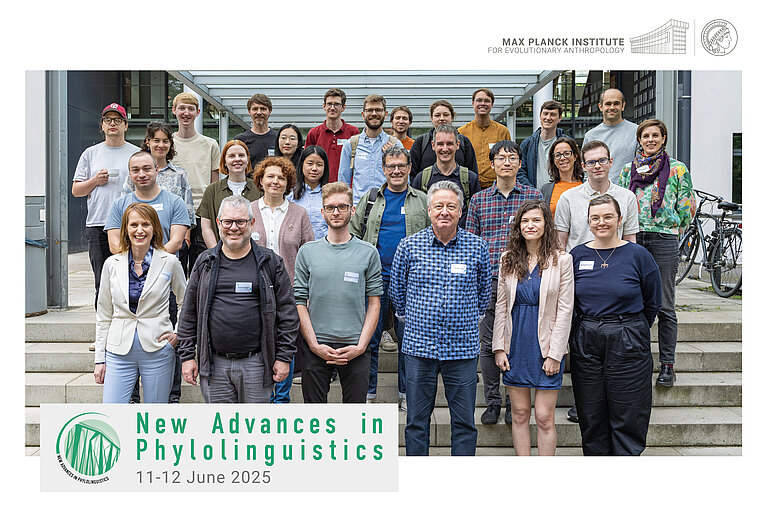
A workshop jointly supported by the Department of Linguistic and Cultural Evolution (MPI-EVA) and the NCCR Evolving Language Centre.
In recent years, computational methods have moved from the fringe to the centre of comparative linguistics. They now sit alongside well-established core methodologies such as philology, the comparative method, and corpus linguistics. They enable researchers to deal with the large amounts of data now becoming increasingly available in web-accessible lexical, typological, grammatical, and phonological databases. This overwhelming influx of data exceeds the capacity of any individual to process accurately from memory. Consequently, there is a growing demand for appropriate computational tools to analyse and interpret the wealth of freely available linguistic information. Computational methods have recently improved, not just in their accuracy and precision but also in their utility. Today, computational methods are used to do far more than build dated language family trees. They have been used to aid in automatic cognate identification, test hypotheses about word-order evolution, compare the dynamics of lexical and grammatical evolution, make rigorous inferences about homelands and migration patterns, and compare linguistic, genetic, and cultural evolution. The list does not stop there. Phylogenetic methods have also been applied to reconstruct phonology, morphosyntactic features, and other typological aspects of language, such as numerals and number marking. Finally, computational methods have recently "branched out" from building phylogenetic trees to study reticulate evolution, including borrowing and other contact-related phenomena. This workshop will focus on recent advances and results in all these areas. We welcome contributions that link diverse datasets, such as phonological, morphological, lexical, and cultural data, explore statistical and computational pipelines for data management and cognate detection, or address reticulation and language contact phenomena.
Invited Contributions
- Sarah Babinski (NCCR)
- Balthasar Bickel (NCCR)
- Frederic Blum (MPI-EVA)
- Gerd Carling (U Frankfurt)
- Angela-Maria Chira (MPI-EVA)
- Ewan Ciuffi (NCCR)
- Alexandru Craevschi (NCCR)
- Laura Dees (NCCR)
- Russell Gray (MPI-EVA)
- Gerhard Jäger (U Tübingen)
- Benedict King (MPI-EVA)
- Natalia Levshina (U Leiden)
- Thomas Roberts (NCCR)
- Clemens Schmid (MPI-EVA)
- Hedvig Skirgård (MPI-EVA)
- Isaac Stead (MPI-EVA)
- Takuya Takahashi (NCCR)
- Timothy Vaughan (NCCR)
- Paul Widmer (NCCR)
Registration
Sorry. Registration for our workshop has already closed.
Program
You can download the latest version of our book of abstracts here.
Day 1 - Wednesday, June 11
| 08:45 - 09:15 | ARRIVAL & REGISTRATION | |
| 09:15 - 09:30 | Russell Gray | Welcome & Opening |
| 09:30 - 10:00 | Balthasar Bickel | On ergodicity in linguistic evolution [slides] |
| 10:00 - 10:30 | Gerhard Jäger | Beyond cognacy: Building the lexibank world tree [slides] |
| 10:30 - 11:00 | COFFEE BREAK | |
| 11:00 - 11:30 | Timothy Vaughan | Toward practical handling of lexical borrowing in computational phylogenetics |
| 11:30 - 12:00 | Laura Dees | Evolutionary dynamics of syllable complexity [slides] |
| 12:00 - 12:30 | Benedict King, Aymeric Hermann, Mary Walworth, Simon Greenhill & Russell Gray | Model misspecification and overestimation of phylogenetic root age in linguistic and biological datasets [slides] |
| 12:30 - 12:40 | GROUP PHOTO SHOOT | |
| 12:40 - 14:00 | LUNCH | |
| 14:00 - 14:30 | Gerd Carling & Nour Efrat-Kowalsky | Building a model for a phylolinguistic inference of grammaticalization [slides] |
| 14:30 - 15:00 | Sarah Babinski, Alexandru Craevschi, Sirui Cheng & Chundra Cathcart | The forest or the supertree: does the world tree make the same predictions about linguistic change as family-specific phylogenies? [slides] |
| 15:00 - 15:30 | Angela Chira | Mosaic versus concerted evolution in grammatical systems [slides] |
| 15:30 - 16:00 | COFFEE BREAK | |
| 16:00 - 16:30 | Thomas Roberts, Paul Widmer & John Mansfield | Punctuated Evolution, and the Social Dynamics of Language Diversification [slides] |
| 16:30 - 17:00 | Wrapping up Day 1 | |
| 17:00 - 20:00 | RECEPTION @ MPI-EVA | |
Day 2 - Thursday, June 12
| 09:30 - 10:00 | Frederic Blum, Pilar Valenzuela & Roberto Zariquiey | Tracing the Evolution of Pano Languages in Parallel with Archaeological Changes in the Ucayali Basin [slides] |
| 10:00 - 10:30 | Isaac Stead | Taiwan as a linguistic area: how not to get catfished by Bayesian phylogeny results |
| 10:30 - 11:00 | COFFEE BREAK | |
| 11:00 - 11:30 | Annemarie Verkerk, Olena Shcherbakova, Hannah J. Haynie, Hedvig Skirgård, Christoph Rzymski, Quentin D. Atkinson, Simon J. Greenhill & Russell D. Gray | Testing linguistic universals with synchronic spatiophylogenetic and diachronic models |
| 11:30 - 12:00 | Ewan Ciuffi | Extrinsic drivers of language diversification |
| 12:00 - 12:30 | Clemens Schmid | Interpolating the spatio-temporal distribution of languages using ancient genomic data |
| 12:30 - 14:00 | LUNCH | |
| 14:00 - 14:30 | Natalia Levshina | Who Did What to Whom - and Why? Untangling typological correlations from the perspective of communicative efficiency and token-based typology |
| 14:30 - 15:00 | Takuya Takahashi | Phylogenetic analysis with concerted changes |
| 15:00 - 15:30 | Alexandru Craevschi, Sarah Babinski & Chundra Cathcart | Semantics drives analogical change in Germanic strong verb paradigms: a phylogenetic study [slides] |
| 15:30 - 16:00 | COFFEE BREAK | |
| 16:00 - 17:00 | Wrapping up this year's workshop: Discussion, Outlook & Publication Plans | |
| 19:00 | Dinner in town (self-organized) | |
Practicalities
Directions on how to get to the workshop venue can be found here.
We have reserved rooms for our invited presenters at Motel One Leipzig-Post, a very conveniently and centrally located hotel.
Organizers
- Russell Gray
- Iren Hartmann
Contact
For inquiries or more information, please get in touch with our departmental administrator. We look forward to a vibrant exchange of ideas among researchers shaping the frontiers of phylolinguistic research.
